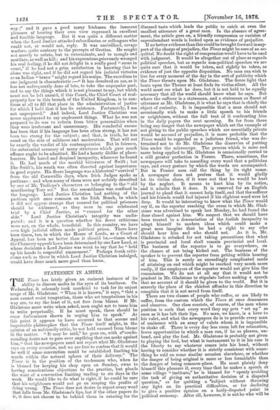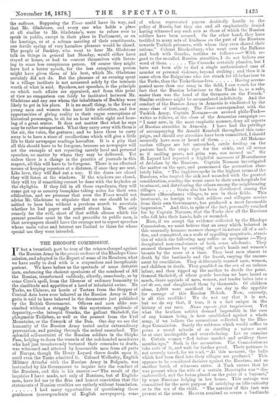STATESMEN IN AMBER. T HE Times has lately given an eminent
instance of its ability to discern moles in the eyes of its brethren. On Wednesday, it solemnly took mankind to task for its unjust usage of Mr. Gladstone. " When it is known," it says," that a man cannot resist temptation, those who set temptations in his way are, to say the least of it, not free from blame. If Mr. Gladstone must write when asked, men ought not to tease him to write perpetually. If he must speak, there should be some forbearance shown in urging him to speak." At this point it appears to have occurred to that serene and impeccable philosopher that the Times itself might, in the opinion of an unfriendly critic, be not held excused from blame in the matter. " It may be said," he goes on, with Oconde- scending desire not to pass over anything that can make against him," that the newspapers need not report what Mr. Gladstone says on every occasion, and we are free to confess that it would be well if some convention could be established limiting his words within the natural sphere of their delivery." The Times is in the position of the tradesman who, when he is blamed for keeping his shop open on Sunday, owns to having conscientious objections to the practice, but pleads the want of a convention limiting trading to six days in the week. He would like to do what is right, if he could be sure that his neighbours would not go on reaping the profits of doing wrong. The Times does not desire to report every word that falls from Mr. Gladstone's lips, but if the other papers do it, it does not choose to be behind them in catering for the diseased taste which leads the public to catch at even the smallest utterance of a great man. In the absence of agree- ment, the article goes on, a friendly compression or excision of superabundant words is looked upon as evidence of prejudice. If no better evidence than this could be brought forward in sup- port of the charge of prejudice, the Times might be sure of an ac- quittal. No doubt the right of compression would have to be used with judgment. It would be altogether out of place as regards political speeches, but as regards non-political speeches we are quite sure that it would be taken, and rightly be taken, as evidence of just the opposite disposition. No matt can wish to live for every moment of the day in the sort of publicity which the Times thrusts upon Mr. Gladstone. The fierce light that beats upon the Throne at least finds its victim silent. All the world must see what he does, but it is not held to be equally necessary that all the world should know what he says. But where the sufferer is a statesman, and a statesman so fluent of utterance as Mr. Gladstone, it is what he says that is chiefly the object of curiosity. It is impossible that a man should not occasionally wish to make a little speech to his friends or neighbours, without the full text of it confronting him in the daily papers the next morning. So far from there being any danger that the newspaper which set the example of not giving to the public speeches which are essentially private would be accused of prejudice, it is more probable that the Times would be regarded as a judicious friend, who was de- termined not to do Mr. Gladstone the disservice of putting him under the microscope. The process which is more and more being applied to Mr. Gladstone is occasionally carried to a still greater perfection in France. There, sometimes, the newspapers will take to recording every word that a politician says, and every gesture by which the words are accompanied. But in France men call the thing by its right name. A newspaper does not profess that it would gladly let its victim alone, if it were not that he would be hurt by the neglect. It means to hurt him by its notice, and it admits that it does. It is reserved for an English journal to plead that it cannot help itself, and that the sufferer and his friends would feel injured if his slightest word were let drop. It would be interesting to know what the Times would say if, on the reporter reaching the room in which Mr. Glad- stone was advertised to speak last Monday, he had found the door closed against him. We suspect that we should have been treated to a denunciation of the foolish incapacity to adapt himself to modern ideas which could make a great man imagine that he had a right to say who should hear him and who should not. As it is, Mi. Gladstone is rebuked for not taking precautions that what is provincial and local shall remain provincial and local. The business of the reporter is to go everywhere, on the chance of not being kicked out. The business of the speaker is to prevent the reporter from getting within hearing of him. This is surely an exceedingly complicated mode of attaining an end which might be reached very much more easily, if the employers of the reporter would not give him the commission. We do not at all say that it would not be prudent in Mr. Gladstone to stipulate before making a speech that no account of it should be given to the world. But it is scarcely the place of the chiefest offender in this direction to complain that it is not saved from itself.
There are two classes of people who suffer, or are likely to suffer, from the custom which the Times at once denounces and observes. One class consists, of course, of the men whose position is such that every word they say gets " set up " as soon as it has left their lips. No man, we know, is a hero to his valet, and what the newspapers do is to provide every man of eminence with an army of valets whom it is impossible to shake off. There is every day less room left for relaxation, fewer opportunities in which a man can, if he so pleases, un- bend, and play the fool. Mr. Gladstone is probably not given to playing the fool, but what is tantamount to it in his case is the liberty to say whatever comes into his head, without having to consider whether it is strictly consistent with some- thing he said on some similar occasion elsewhere, or whether the danger of being original is more or less formidable than the danger of being common-place. He must plainly deny himself this pleasure if, every time that he makes a speech at some village "institute," he is blamed for " openly avoiding the task of giving an authoritative decision of a disputed question," or for quitting a 'subject without throwing any light on its practical difficulties, or for declining to give a positive opinion on a hotly-disputed point in political economy. After all, however, it is not he who will be the sufferer. Supposing the Times could have its way, and that Mr. Gladstone, and every one who holds a place at all similar to Mr. Gladstone's, were to refuse ever to speak in public, except in their place in Parliament, or on the hustings, or at a solemn meeting of their constituents, one fertile spring of very harmless pleasure would be closed. The people of Buckley, who went to hear Mr. Gladstone talk on things in general last Monday, would either have stayed at home, or had to content themselves with listen- ing to some less conspicuous person. Of course they might have had a better speech, for the less conspicuous person might have given them of his best, which Mr. Gladstone certainly did not do. But the pleasure of an evening spent in a village institute is not measured solely by the intrinsic worth of what is said. Speakers, not speeches, is the principle on which such affairs are appraised, and from this point of view no comparison can fairly be instituted between Mr. Gladstone and any one whom the inhabitants of Buckley were likely to get in his place. It is no small thing, in the lives of young men and women who have little education, and few opportunities of giving reality to their vague conceptions of historical personages, to sit for an hour within sight and hear- ing of a great orator. It does not matter that what he says may be rather unimportant. What they carry away with them is the air, the voice, the gestures; and to have these to carry away is to have a store of recollections which will give a little life to their newspaper readings hereafter. It is a pity that all this should have to be foregone, because no newspaper will set the example of not reporting merely local and personal speeches, no matter by whom they may be delivered. Yet unless there is a change in the practice of journals in this respect, all this will have to be foregone. There is no effectual means of keeping reporters at a distance, if once they are sent. Like love, they will find out a way. If the doors are closed they will listen at the windows. If the windows are closed, they will try if something cannot be done with the keyholes or the skylights. If they fail in all these expedients, they will come got up as country bumpkins taking notes for their own edification, and we presume that even the Times would not advise Mr. Gladstone to stipulate that no one should be ad- mitted to hear him without a previous search to ascertain whether he had paper and pencil about him. The only remedy for the evil, short of that selfish silence which the present practice must in the end prescribe to public men, is that newspapers should have the courage not to report speeches whose main value and interest are limited to those for whose special use they were intended.



































 Previous page
Previous page